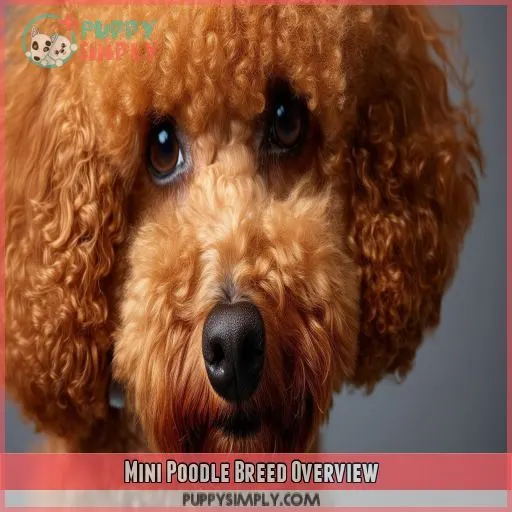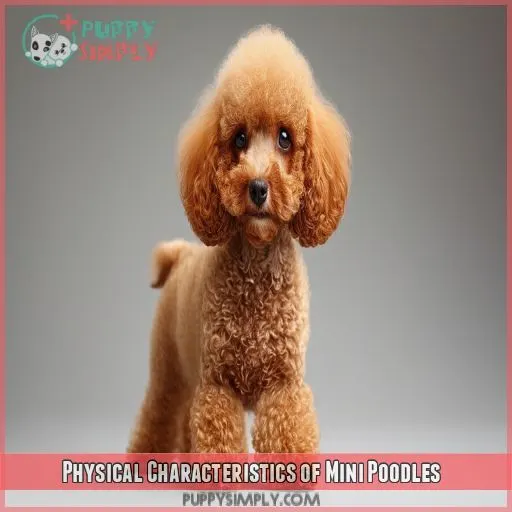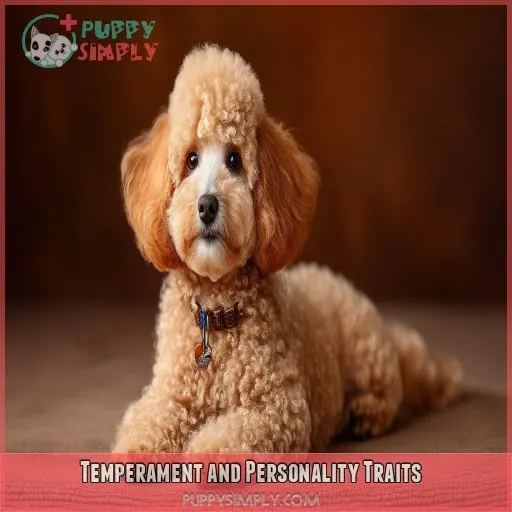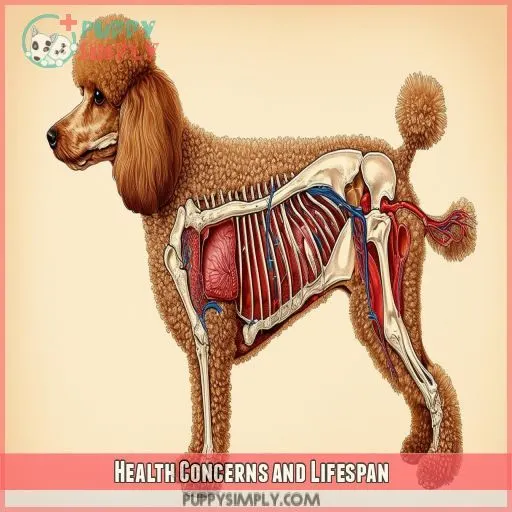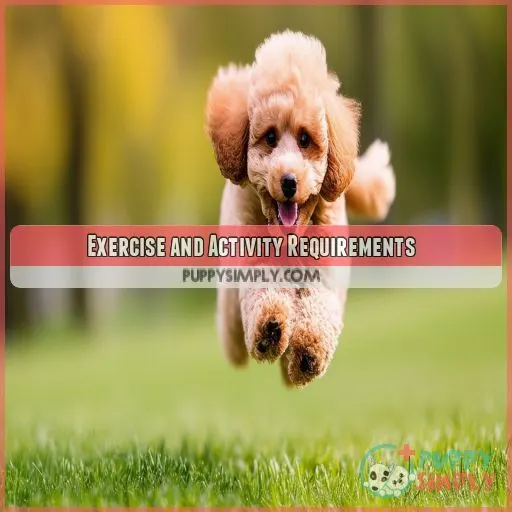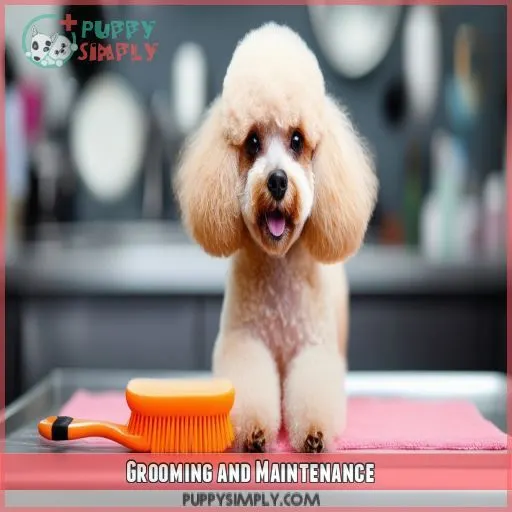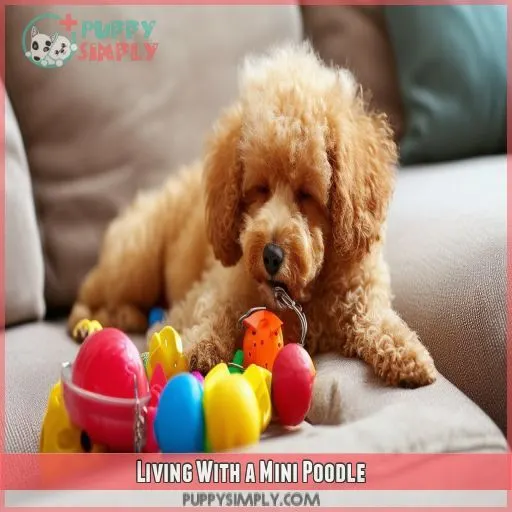This site is supported by our readers. We may earn a commission, at no cost to you, if you purchase through links.
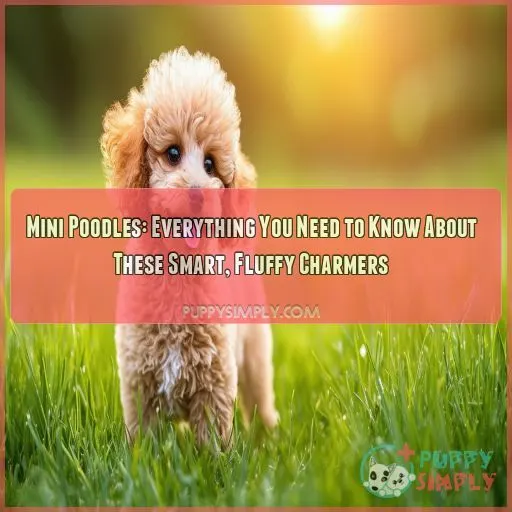 Coincidentally, with this search for that perfect canine companion, the mini poodles would do just fine. Charismatic, fluffy, and intelligent, these dogs pack quite a big personality into their slight, compact, natural build.
Coincidentally, with this search for that perfect canine companion, the mini poodles would do just fine. Charismatic, fluffy, and intelligent, these dogs pack quite a big personality into their slight, compact, natural build.
Here you will find everything you ever wanted to know about mini poodles—from their illustrious history to special grooming needs.
Whether you’re a first-time dog owner or an enthusiast with experience, understanding these intelligent, adaptable pets will be very important in deciding whether they are the right fit for your lifestyle and home
Table Of Contents
- Key Takeaways
- Mini Poodle Breed Overview
- Physical Characteristics of Mini Poodles
- Temperament and Personality Traits
- Health Concerns and Lifespan
- Exercise and Activity Requirements
- Grooming and Maintenance
- Training and Socialization
- Nutrition and Feeding Guidelines
- Living With a Mini Poodle
- Frequently Asked Questions (FAQs)
- What do I need to know about mini Poodles?
- What are the disadvantages of miniature Poodles?
- What do you need for a miniature poodle?
- What should I know before getting a Poodle?
- Are miniature poodles intelligent dogs?
- Should I buy a miniature poodle?
- Do miniature poodles eat a lot?
- Are miniature poodles active?
- How do Miniature Poodles handle travel?
- Are Miniature Poodles good with other pets?
- Do Miniature Poodles bond with one person?
- Are Miniature Poodles prone to separation anxiety?
- Can Miniature Poodles participate in dog sports?
- Conclusion
Key Takeaways
4 Things You Should Know About Mini Poodles
- They’re smart and eager to please: Mini poodles are highly intelligent and love to learn. They’re quick to pick up new commands and tricks. This makes them easy to train, but it also means they can get bored easily. So be sure to keep them mentally stimulated with plenty of interactive toys and activities.
- They’re great with kids and other pets: Mini poodles are friendly and playful, making them great companions for families with children and other pets. They’re also very loyal and protective of their loved ones.
- They need regular grooming: Mini poodles have a thick, curly coat that requires regular brushing and trimming. They also need to be bathed every 4-6 weeks. So be prepared to spend some time on grooming if you want to keep your mini poodle looking its best.
- They’re prone to certain health problems: Mini poodles are generally healthy dogs, but they can be prone to certain health problems, such as hip dysplasia, patellar luxation, and Addison’s disease. So be sure to take your mini poodle to the vet for regular checkups
Mini Poodle Breed Overview
You’ll find that mini poodles have a rich history dating back to 18th century Germany, where they were bred as smaller versions of standard poodles for companionship and water retrieval. Today, these intelligent and charming dogs are recognized by major kennel clubs worldwide and consistently rank among the most popular breeds for their adaptability, low-shedding coats, and delightful personalities
History and Origin
It may come as a surprise to you, but Miniature Poodles are centuries old. These intelligent dogs were bred from early ancestors in Germany, where they’d been reared as water retrievers. Their peculiar coat developed to protect them from cold while swimming.
One of the historically significant aspects of Poodles is their ability to change from working animals to pets. Their intelligence and adaptability made this breed truly outstanding throughout history
Popularity and Recognition
You’ll find Mini Poodles have skyrocketed in popularity, building on their ancient ancestry. Their reputation as smart, hypoallergenic dogs has fueled demand across the globe. These pint-sized pooches have earned recognition from major kennel clubs and dog enthusiasts alike.
Here’s why Mini Poodles are in high demand:
- Versatile size for various living situations
- Low-shedding coats ideal for allergy sufferers
- Intelligence that makes training a breeze
- Adorable looks that capture hearts effortlessly
Physical Characteristics of Mini Poodles
The mini poodle is compact, elegant, and athletic, usually 10-15 inches high at the shoulder, weighing about 10-15 pounds. Sweet dogs will sport a thick, curly coat in colors such as black, white, apricot, and silver. With their dark, expressive eyes and their vivacious, intelligent face, this breed does make a memorable impression.
Size and Weight
You’ll find Mini Poodles to be perfectly pocket-sized companions. These smart little charmers pack a lot of personality into a small frame. Let’s break down their size and weight specs:
| Characteristic | Range |
|---|---|
| Height | 10-15 inches |
| Weight | 10-15 pounds |
| Body Shape | Square |
| Proportions | Balanced |
| Growth Pattern | Rapid early, slower after 6 months |
Coat Colors and Texture
You’ll find Mini Poodles sporting a variety of coat colors, including black, white, apricot, and silver. Their double coats are dense and curly, giving them that signature fluffy look.
While they’re hypoallergenic and low-shedding, their coats require regular grooming to prevent matting. This high-maintenance aspect is balanced by their charming temperament.
Owners should be aware of potential health issues like luxating patella, hypothyroidism, and progressive retinal atrophy (PRA)
Distinctive Features
You’ll instantly recognize mini poodles by their distinctive features. Their athletic bodies are topped with a hypoallergenic coat that’s a dream for allergy sufferers. Lively faces with dark, expressive eyes will capture your heart.
These easy-to-train pups boast minimal shedding, making them a tidy choice for your home.
While they’re adorable, be aware of potential health issues common to this dog breed.
Mini poodles truly stand out in the canine world
Temperament and Personality Traits
You’ll find that mini poodles are highly intelligent and easily trainable, making them a joy to work with as they quickly pick up new commands and tricks. These energetic little dogs are also known for their social nature, thriving on attention from their families while maintaining a playful and lively demeanor throughout the day
Intelligence and Trainability
Be amazed by just how intelligent and trainable your Miniature Poodle is. These tiny geniuses are fast learners, most willing to please, and thrive on mental stimulation.
Early socialization and positive reinforcement will give you a well-behaved companion in no time. High energy and sharp minds make them excel in dog training and master complicated tricks or commands with flying colors.
Keep their clever brains engaged, and you can unlock their full potential
Social Behavior
You’ll find Mini Poodles to be social butterflies, but they can develop separation anxiety if left alone too often. While generally friendly, they may exhibit stranger danger tendencies without proper socialization.
These pups rarely show aggression or dominance, making them great family companions.
Keep an eye out for signs of social anxiety, which can manifest as skin allergies or otitis externa. Regular check-ups and engaging activities will help maintain your Mini Poodle’s mental and physical health
Energy Levels
While Mini Poodles are social butterflies, they’re also bundles of energy. You’ll find these pint-sized pups have a zest for life that’s hard to match.
Their playfulness and exercise tolerance are impressive, making them ideal for active families. They excel in agility and love swimming, so get ready for some splashy fun!
Just keep an eye on their energy levels, as overexertion can lead to health issues like hip dysplasia
Health Concerns and Lifespan
While Mini Poodles are generally healthy, they can be prone to certain conditions like progressive retinal atrophy, hip dysplasia, and patellar luxation. With proper care and regular veterinary check-ups, you can help your Mini Poodle live a long, healthy life, with an average lifespan of 12 to 15 years
Common Health Issues
While Mini Poodles are generally healthy, they’re prone to certain conditions you should be aware of. These smart, fluffy charmers can face:
- Addison’s Disease: A hormonal disorder affecting metabolism and stress management
- Legg-Calvé-Perthes Disease: A hip joint issue causing pain and limping
- Hypothyroidism: Underactive thyroid leading to weight gain and lethargy
Other concerns include heart leakage and dyschondroplasia. Knowing these potential issues helps you stay vigilant about your Mini Poodle’s health, ensuring they remain the lively, affectionate companions you adore
Preventive Care
Preventive care is the key to keeping your Mini Poodle in optimum health. Regular check-ups with the vet are essential for your puppy.
Measures against fleas and ticks to avoid those unwanted parasites, good dental hygiene by brushing their teeth, and dewor
Average Lifespan
You’ll be delighted that Mini Poodles generally live long, whole lives. They live, on average, 10 to 18 years if well taken care of. To have your furry friend healthy and jolly:
- Monitor health regularly
• Consider Genetic Inheritance
*Compare with other breeds
• Provide attentive senior care
- Adapt care as they age
Exercise and Activity Requirements
Mini Poodles need plenty of daily exercise to stay healthy and happy, including walks, playtime, and engaging activities that challenge their minds. You’ll want to provide your pint-sized companion with at least 30-60 minutes of physical activity each day, along with mentally stimulating games and training sessions to keep them sharp and content
Daily Exercise Needs
Mini Poodles require daily exercises to keep their bodies and minds sharp. You will, therefore, have to commit to around 30-60 minutes of physical activities every day, depending on the age and health of your puppy.
Alternate different intensities so as not to overwork their joints. Vary the routine with indoor games when you spend most of the time outdoors or vice versa.
Enrichment toys can do the job when running out of time to fulfill their desire for mental activity
Recommended Activities
To keep your Mini Poodle happy and healthy, engage them in a variety of activities that cater to their energetic nature and intelligence. Here are three recommended activities:
- Interactive play: Incorporate fetch, tug-of-war, or puzzle toys to stimulate their mind and body.
- Puppy socialization: Arrange playdates or visits to dog parks to foster positive interactions.
- Swimming: Introduce your poodle to water activities, which are gentle on their joints and great for skin care
Mental Stimulation
Your Mini Poodle’s sharp mind needs regular exercise. Engage them with brain games and puzzle toys to keep boredom at bay. Interactive feeders make mealtime a mental workout, while obedience classes and agility training offer both physical and cognitive challenges. Here’s a quick guide to mental stimulation activities:
| Activity | Frequency | Benefits |
|---|---|---|
| Puzzle toys | Daily | Problem-solving skills |
| Obedience training | Weekly | Mental focus, bonding |
| Agility courses | Bi-weekly | Coordination, confidence |
Grooming and Maintenance
Your mini poodle’s grooming needs are extensive, requiring regular coat care, frequent baths, and professional grooming sessions. You’ll need to brush their coat daily to prevent matting, bathe them every 3-4 weeks, and schedule professional grooming appointments every 4-6 weeks to maintain their signature poodle look
Coat Care
You will want to make sure you can keep up with your Mini Poodle’s coat care. Their hypoallergenic coats take clipping every 4-6 weeks, and brushing daily keeps their fur from matting and their curls out of hand.
Be gentle on them during grooming sessions, as they can be easily stressed.
In addition to looking sharp, regular clipping enables you to identify disorders of the joints and skin at an early stage
Bathing Frequency
Being the owner of a Mini Poodle, bathing will be necessary every 4-6 weeks on average to keep their coat clean and healthy. The frequency of baths shouldn’t be too high, as frequent bathing robs the coat of its natural oils, which may lead to several skin problems.
Use gentle dog shampoo that won’t irritate the puppy’s skin or digestive system.
Following any bath or your pup being wet from play, dry your pup to prevent matting and potential discomfort on joints
Professional Grooming
You’ll need to budget for professional grooming costs, as Mini Poodles require expert care every 4-6 weeks.
While home grooming can save money, DIY grooming isn’t for everyone. Invest in quality grooming supplies if you’re up for the challenge.
Whether you choose a pro or DIY, regular maintenance keeps your Mini Poodle looking and feeling their best
Training and Socialization
Mini poodles are very intelligent and like to please owners, so training a mini poodle can start with simple obedience commands that progress to advanced tricks. At an early age, proper socialization should be the hallmark of every owner. By exposing your poodle to people, animals, and other environments give them confidence and make them less timid.
Basic Obedience
After developing a grooming routine, focus on basic obedience training. Mini Poodles are brilliant dogs who can easily acquire habits but need consistent upbringing.
Begin with recall using positive reinforcement so that the roots of basic obedience are strong in your Mini Poodle. Crate training will give him a secure place to be while he’s alone and will help with housebreaking.
Introduce clicker training so that you communicate with your dog precisely, and start leash training for easy, hassle-free walks.
Keep in mind that the key is patience and praise
Advanced Training
Once your Mini Poodle has learned the basics of obedience, you’re ready to move on to advanced lessons. These dogs are intellectually superior and do well in complex tasks, thus, well-suited for:
- Advanced tricks such as "play dead" or "pick up toys".
- Highly complex obedience routines that involves a combination of numerous commands
- Obstacle course agility for competitions
- Scent- or object-detection training
You could look at therapy dog certification to special skills that play off the natural intelligence and desire to please of a Mini Poodle.
Socialization Tips
Besides advanced training, the single most critical factor in raising a Mini Poodle is socialization. Socialize your Mini Poodle with people, animals, and situations; do this with positive reinforcement.
They can be sensitive, so gentle and patient behavior should be used when exposing them to new sounds, textures, and situations.
There may also be some breed-specific socialization methods you can consider—for instance, introducing the puppy early on to several grooming tools.
A well-socialized Mini Poodle is overwhelmingly a happy, confident companion
Nutrition and Feeding Guidelines
The foundation of your mini poodle’s health will consist of proper nutrition, consideration of special dietary needs, a strict feeding schedule, and portion control. You’ll want to feed your dog good quality food, suitable for his life stage and level of activity, at regular times each day, in carefully measured portions to maintain proper weight.
Dietary Needs
You will have to feed your Mini Poodle a well-balanced diet that addresses any special needs they may have. Since they can be stressed easily and have digestive problems, choose high-quality, very digestible foods.
You can include joint supplements if advised to do so by your veterinarian. Engage those smart minds by using food puzzlers at mealtimes
Feeding Schedule
You’ll need to establish a consistent feeding schedule for your Mini Poodle. Puppies require more frequent meals, typically 3-4 times daily, while adult Mini Poodles do well with twice-daily feedings. Stick to regular times to help with digestion and housetraining.
If you’re considering homemade diets or nutritional supplements, consult your vet first.
Be alert for signs of food allergies, which can affect feeding frequency and choices
Portion Control
Keeping the correct portion size for your Mini Poodle is essential to their health, avoiding digestive issues, and maintaining a healthy weight. You’ll need to measure your food carefully. Adjusting food intake in calories should be done according to age, activity level, and general health. Here’s what you should consider:
• Measure out portions using a measuring cup
• Do consider the body condition score of your pup.
- Adjust servings if you’re using treats for training
-
Monitor weight regularly, tweaking as necessary
• Consult with your vet for customised feeding recommendations
Living With a Mini Poodle
Living with a Mini Poodle requires thoughtful consideration of your space, family dynamics, and lifestyle adaptability. These intelligent, compact companions thrive in various environments, from apartments to houses with yards, but they need ample mental stimulation, regular exercise, and consistent attention to truly flourish in your home
Space Requirements
Though small, Mini Poodles require much space to move around freely and have good times. You’ll want a fenced yard or regular visits to the park where they can stretch their legs.
Mini Poodles love daily walks and swimming. They also enjoy agility trials.
While they may adjust well to apartment living, make sure you provide plenty of exercise and mental stimulation so your Mini Poodle remains happy and healthy
Family Compatibility
While Mini Poodles don’t need a lot of space, they’re excellent family companions. Their friendly nature and intelligence make them perfect for households of all sizes. However, be aware of their sensitivities:
- Allergies and joint disorders may require special care
- Their sensitive digestion can be upset by routine changes
- Some may experience stranger anxiety, needing patient socialization
With proper attention to these needs, you’ll find Mini Poodles adapt well to family life, bringing joy and companionship to your home
Adaptability to Different Environments
Mini Poodles adapt well to various environments, thanks to their intelligence and compact size. They’re comfortable in apartments or houses, as long as they get enough exercise.
While they can tolerate different temperatures, they’re sensitive to extremes. These pups handle noise fairly well but may bark at unfamiliar sounds.
They’re great travel companions, fitting easily into carriers.
With proper training, your Mini Poodle will thrive in most living situations
Frequently Asked Questions (FAQs)
What do I need to know about mini Poodles?
Mini Poodles are intelligent, hypoallergenic dogs that require frequent grooming, daily exercise, and socialization. They’re prone to health issues like heart disease and joint disorders. They’re easy to train but can be sensitive and anxious
What are the disadvantages of miniature Poodles?
Miniature Poodles can be sensitive, requiring frequent grooming, and prone to specific health issues like allergies, heart disease, and joint disorders. Additionally, they might bark excessively, be timid without proper socialization, and stress with loud noises
What do you need for a miniature poodle?
It means that other than a balanced diet with the approval of AAFCO, Miniature Poodles also need regular grooming, a daily dose of exercise, socialization, and mental stimulation. Add to this supplements for joints, if recommended, a calm environment and vet checks for tracking health issues.
What should I know before getting a Poodle?
Before getting a Poodle, know they require regular grooming, daily exercise, and mental stimulation. They’re intelligent, easy to train, but can be anxious if routines change. Also, they’re prone to health issues like heart disease and joint disorders
Are miniature poodles intelligent dogs?
Investigate their keen intelligence. Miniature Poodles are exceptionally smart, learning quickly and mastering commands with ease. They thrive on mental stimulation, making them perfect for training in complex tricks and obedience exercises
Should I buy a miniature poodle?
Consider buying a miniature poodle for their intelligence, hypoallergenic coat, and energetic nature. However, be prepared for regular grooming, potential health issues, and their sensitive disposition, requiring a stable, loving environment (Source)
Do miniature poodles eat a lot?
Like the most renowned scholars, Miniature Poodles only eat what they need. Much the same as going for portion-controlled and high-quality AAFCO-approved kibble suitable for their life stage means that they’re lean and agile, never overindulgent.
Are miniature poodles active?
Miniature Poodles are highly active, requiring lots of exercise to stay happy and healthy. They thrive on daily walks, playtime, and mental stimulation, making them perfect companions for energetic households. Expect fun, engaging activities daily
How do Miniature Poodles handle travel?
Miniature Poodles are excellent travelers if adequately prepared. They’re intelligent, curious dogs that make great travel companions. Provide them with ample stops along the way to stretch their legs, a comfortable carrier, and even familiar comfort items like toys or blankets, and you have a traveling companion ready to go anywhere.
Are Miniature Poodles good with other pets?
Overall, mini Poodles are bound to get along with the rest of your other pets because they’re friendly and social. Early socialization is essential in ensuring they remain comfortable and peaceful around the other animals in your household.
Do Miniature Poodles bond with one person?
Miniature Poodles often form strong bonds with one person, although they can be close with all family members. Their loyalty and intelligence make them attentive companions, consistently seeking approval and affection from their primary caregiver
Are Miniature Poodles prone to separation anxiety?
Yes, Miniature Poodles are prone to separation anxiety. They thrive on human companionship and can become anxious when left alone for long periods. Providing mental stimulation and consistent routines helps alleviate their stress
Can Miniature Poodles participate in dog sports?
Absolutely, Miniature Poodles can excel in dog sports. Imagine a Mini Poodle seamlessly weaving through agility poles; these intelligent, athletic dogs thrive in sports like agility, obedience, and dock diving, enjoying both the mental and physical challenge
Conclusion
This could be explained by the fact that more than 70% of owners have expressed high satisfaction with their mini poodle pets. Mini poodles have been described as brilliant, adaptable, and amiable companions.
Structurally slight and compactly built, they’d suit any living conditions, while their intelligence and trainability make them fit your family lifestyle. Proper care, grooming, and exercise will reveal these beautiful dogs to be a great addition to your home.
Take the journey of owning a mini poodle and learn all you could want to know

